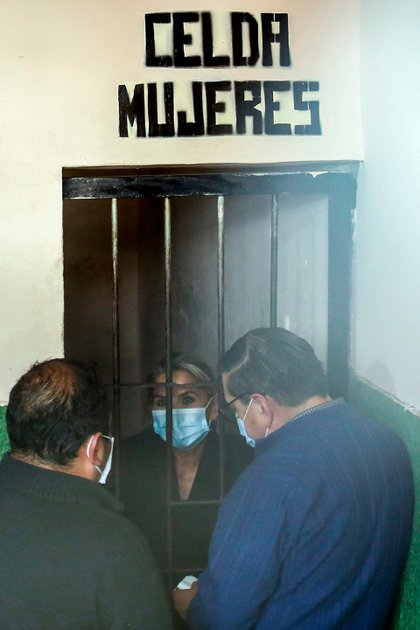 Through an active campaign to exclude Bolivia’s dictatorship, attempts are underway to cap the number of 21st Century Socialism’s dictatorships in the Americas to Cuba, Venezuela, and Nicaragua. In these four countries, the same system for the violation of human rights, the absence of the rule of law, the inexistence of the separation and independence of the branches of government, the intolerance of free political organization, and elections to vote but not to elect, has been installed. A fundamental proof that these are dictatorships, is the existence of political prisoners and exiles and in Bolivia there are 42 political prisoners that must be released.
Through an active campaign to exclude Bolivia’s dictatorship, attempts are underway to cap the number of 21st Century Socialism’s dictatorships in the Americas to Cuba, Venezuela, and Nicaragua. In these four countries, the same system for the violation of human rights, the absence of the rule of law, the inexistence of the separation and independence of the branches of government, the intolerance of free political organization, and elections to vote but not to elect, has been installed. A fundamental proof that these are dictatorships, is the existence of political prisoners and exiles and in Bolivia there are 42 political prisoners that must be released.
Evo Morales ascended to the presidency of the Republic of Bolivia in January of 2006 with a mandate for a single term of five years without re-election. Using the 21st Century Socialism’s -or Castrochavism- model, Morales overruled the Republic’s constitution that did not allow its total reform and imposed a Constituent Assembly and through more crime and bloody massacres drafted -in an ordinary Congressional Session- the constitution of the “Plurinational State” supplanting the Republic of Bolivia in order to be continuously re-elected.
Fraudulently re-elected in 2009 and 2014, he called for a referendum to enable his indefinite re-election and Bolivia said NO on 21 February of 2016. Afterwards, he manipulated his Constitutional Tribunal who, perverting the course of justice, ruled that “he has the human right for indefinite re-election”, a ruling that was later disproved and denied by the Interamerican Court of Human Rights. This is how Evo Morales got to his greatest fraud, the elections of 20 October of 2019 wherein he committed flagrant crimes of material and ideological falsification, use of counterfeited means, organized crime, and more.
Faced with a civic reaction and unable to impose his orders upon the Bolivian police and armed forces for a massacre and the violation of human rights, Morales resigned and fled. The October 2019 electoral fraud was corroborated by Morales himself who asked for an electoral audit with the Organization of American States whose report confirmed and certified the fraud, just as the European Union did.
Morales’ resignation gave way to an interim government labeled as transitional towards democracy with Senator Jeanine Añez as President which, by retaining the forged Plurinational State’s constitution, by not restoring the Republic, and by granting Evo Morales and his accomplices impunity, turned out to be a government of dictatorial continuity. From Mexico, Cuba and Argentina, Evo Morales continued attacking the Bolivian nation with bloody massacres at Senkata and Sacaba that he personally ordered to take place.
President Añez used the dictatorship’s constitution to proclaim herself a presidential candidate in elections whose transparency she was tasked to oversee. By using the dictatorship’s laws her government was also a government for the continuity of corruption.
Voters’ registration list was not reviewed, the functional opposition remained divided, dictatorship’s laws were not changed and the system remained intact for the resulting new electoral fraud in the elections of 18 October of 2020 that yielded as the winner, in the first round of voting, the dictatorship’s candidate Luis Arce who immediately afterwards orchestrated the return with impunity from prosecution of Evo Morales who is the “dictator-in-chief”.
As a strategy for Evo Morales’ return to the presidency, Castrochavism invented a “criminal narrative” to adulterate the facts during the period October 2019 to October 2020. With the alteration and simulation of truth, it changed fraud and other crimes committed by Morales to a “coup d’état”. With that narrative, so fake and so criminal, they again started using the prosecutors and judges, filed suits against Jeanine Añez, members of her government, civic and youth leaders, military, police, and common citizens and arrested them.
and judges, filed suits against Jeanine Añez, members of her government, civic and youth leaders, military, police, and common citizens and arrested them.
In such suits -similar with respect to 2003 and 2008 and just as in Cuba, Venezuela and Nicaragua, there is the violation of; human rights, the presumption of the accused’s innocence, equity before the law, the non-retroactivity of the law, and the legal due process. Impartial judges are non-existent, these are not suited proceedings, they are lynching, in which the entire power of the government is used against victims who are POLITICAL PRISONERS.
Up to the 6th of September of 2021, Global Human Rights League documents the existence of “42 political prisoners of Luis Arce/Evo Morales’ dictatorship in Bolivia. These are 3 women and 39 men that include 13 military and 6 policemen. The most notorious prisoner is former president Jeannine Añez who, as a victim of the violation of all of her rights, attempted to take her own life and now is ailing from “medication controlled by the regime”. The Interamerican Commission of Human Rights has received urgent complaints and requests for certain steps but, just as in Nicaragua, Cuba, and Venezuela, there continue to be political prisoners and the dictatorships have them to dole-out “state-sponsored terrorism”.
www.carlossanchezberzain.com
Comments powered by CComment